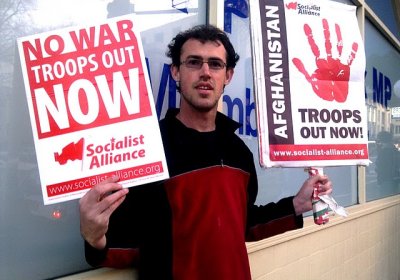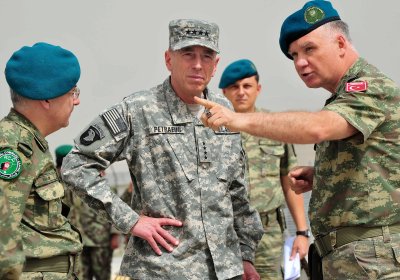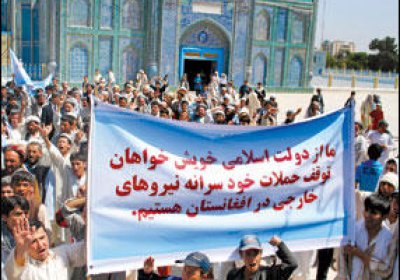Statement from the Socialist Alliance National Executive October 8, 2010.
War on Afghanistan (2001–2021)
Hazara asylum seekers, who broke out of the Northern Immigration Detention Centre in Darwin on September 1 to hold a peaceful seven-hour protest, have been transferred to the WA Curtin detention centre.
On September 3, Australian Association of Hazaras spokesperson Arif Fayazi told ABC radio he was concerned for their welfare.
Fayazi said that when he was in detention in similar circumstances in 2000, many of his fellow detainees became so distressed they harmed themselves.
Veterans peace group Stand Fast and the Peace Bus held a protest against the war in Afghanistan on September 9 at the gates of Enoggera Barracks. Enoggera is the home of the 7th Brigade and one of Australia's largest military bases.
Also present were members of a local anti-war group who hold a vigil every Thursday against the war on the main road near the entrance to the barracks.
Speakers at the protest included military veterans Hamish Chitts and Graeme Dunstan. Many motorists passing by, including some military personnel, waved their support or "honked for peace".
The TV anchorwoman was conducting a split screen interview with a journalist who had volunteered to be a witness at the execution of a man on death row in Utah for 25 years.
“He had a choice”, said the journalist, “lethal injection or firing squad”. “Wow!” said the anchorwoman.
Cue a blizzard of commercials for fast food, teeth whitener, stomach stapling, the new Cadillac. This was followed by the war in Afghanistan, presented by a correspondent sweating in a flak jacket.
Citizens rallied in two Afghan cities on July 10 and 11, chanting slogans against the occupying powers and the unpopular regime of President Hamid Karzai for failing to protect civilians.
On July 10, hundreds took to the streets of Mazar-i-Sharif to demand that all occupation forces leave.
The protest was organised after an artillery barrage from occupying NATO forces killed six civilians in Paktia province on July 8 and US troops killed two civilians in a pre-dawn raid in the city on July 7.
Protesters chanted slogans against occupation forces and Karzai.
Terrorism and the Economy — How the War on Terror is Bankrupting the World
By Loretta Napoleoni
Seven Stories Press, 176 pages
Review by Thomas Kollmann
With no end in sight to operations in Afghanistan, an incisive review of how the much-hyped international events of the last nine years have led us there is very welcome.
Economist Loretta Napoleoni is renowned for throwing light on the murky world of the financing of terrorist groups.
Prime Minister Julia Gillard’s July 5 announcement that she would solve the refugee crisis by being tougher on refugees did what former PM John Howard failed to do in his 11 years of conservative rule. She has made former One Nation MP Pauline Hanson feel at home.
Hanson announced she wasn’t emigrating to Britain, as planned, saying she was in “total agreement” with Gillard’s plan to “sweep political correctness from the debate”, the Australian said on July 6.
Gillard’s main proposals cast refugees as a problem to be solved — and blame the refugees for that problem.
According to a recent study by the United States Geological Survey, Afghanistan has nearly one trillion dollars in mineral deposits. The study claimed to have found previously unknown reserves of lithium, gold, cobalt and other minerals.
According to the New York Times: “An internal Pentagon memo … states that Afghanistan could become the ‘Saudi Arabia of lithium’, a key raw material in the manufacture of batteries for laptops and BlackBerrys.”
“Break the war alliance” is one of the key messages anti-war groups will send to US President Barack Obama when he visits Australia in June.
Protesters plan to focus on the stepped-up US war drive in Afghanistan and Pakistan. They will also demand of Obama and Prime Minister Kevin Rudd that the occupying troops leave.
Compared to the Bush administration, total US defence spending is projected to rise from US$534.5 billion in 2006 to $663.7 billion in 2010 according to Congressional budget papers.
- Previous page
- Page 8








